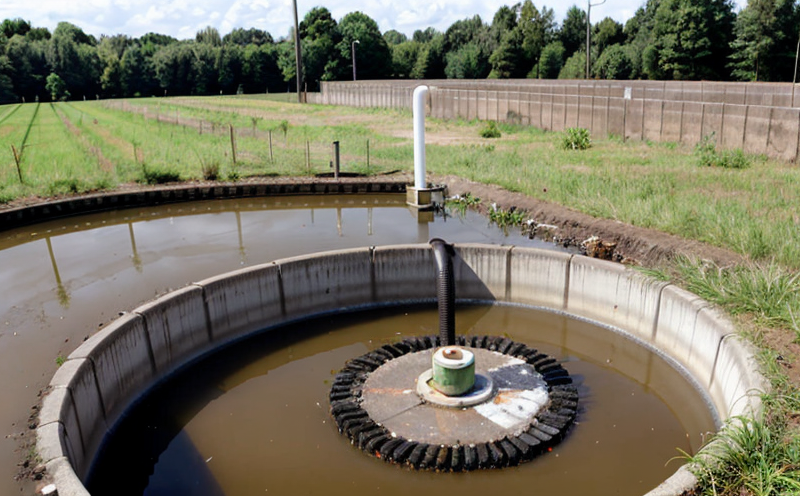ISO 11923 Suspended Solids Testing in Wastewater
The ISO 11923 standard provides a precise method for measuring suspended solids in wastewater, which is critical for environmental compliance and process optimization. This test is essential for industries that discharge effluent into water systems or treat wastewater to meet regulatory standards.
Understanding the concentration of suspended solids in wastewater is crucial because high levels can lead to sedimentation issues in treatment plants, affect aquatic life by reducing oxygen levels, and violate discharge limits set by environmental protection agencies. The ISO 11923 method ensures accurate and consistent measurements that support effective management practices.
The test involves filtering a known volume of wastewater through pre-weighed filters, drying the filter to a constant weight, and then calculating the suspended solids concentration based on the difference in mass before and after filtration. This process is carried out under controlled conditions to ensure accuracy and reliability.
Accurate measurement of suspended solids using ISO 11923 helps facilities:
- Evaluate the efficiency of their wastewater treatment processes
- Determine compliance with discharge limits specified by regulatory authorities
- Optimize operational parameters for improved performance
- Ensure safe and effective reuse or discharge of treated water
The ISO 11923 method is widely accepted in the industry for its robustness and repeatability. It is particularly useful in sectors like municipal wastewater treatment, industrial manufacturing, and environmental monitoring.
The standard's applicability extends to various types of wastewater, including domestic sewage, industrial effluents, and stormwater runoff. By adhering to this method, facilities can ensure consistent results across different batches or samples, which is vital for maintaining regulatory compliance and operational efficiency.
Given the importance of this test in ensuring environmental protection and process optimization, it's essential for quality managers, compliance officers, R&D engineers, and procurement teams to understand its significance. This knowledge supports informed decision-making processes and enhances overall performance within wastewater management systems.
Industry Applications
| Application Area | Description |
|---|---|
| Municipal Wastewater Treatment Plants | Monitoring suspended solids helps in optimizing treatment processes and ensuring compliance with discharge limits. |
| Industrial Manufacturing Facilities | Ensuring clean effluent for safe disposal or reuse is critical, making this test vital for industrial operations. |
| Agricultural Waste Management | Accurate measurement of suspended solids assists in managing agricultural runoff effectively and reducing environmental impact. |
| Environmental Monitoring Agencies | The method supports the collection of reliable data to inform policy decisions and environmental management strategies. |
In each application, the ISO 11923 method plays a pivotal role in maintaining compliance with stringent environmental regulations and promoting sustainable practices. By employing this standardized approach, various stakeholders can achieve consistent and accurate measurements, thereby enhancing their operational efficiency and environmental responsibility.
Why Choose This Test
The ISO 11923 Suspended Solids Testing method is preferred for several reasons that make it indispensable in wastewater management:
- International Recognition: The standard is widely recognized and accepted globally, ensuring consistency across different regions.
- Accurate Results: It provides precise measurements of suspended solids, crucial for accurate process control and compliance verification.
- Safety Compliance: By adhering to this method, facilities can ensure they meet the strictest environmental safety standards.
- Operational Efficiency: Accurate data from this test helps in optimizing treatment processes and reducing operational costs.
- Data Reliability: The standardized approach ensures that results are repeatable and reliable across multiple samples and testing sessions.
- Regulatory Compliance: This method is a key requirement for many regulatory bodies, ensuring seamless compliance with environmental laws.
- Improved Decision-Making: Accurate data enables informed decisions regarding process improvements and operational strategies.
The ISO 11923 Suspended Solids Testing is not just a standard; it's an essential tool for maintaining environmental responsibility, ensuring safe operations, and achieving regulatory compliance. Its robust methodology makes it the preferred choice for quality managers, compliance officers, R&D engineers, and procurement teams.
International Acceptance and Recognition
- The ISO 11923 standard is recognized by international bodies such as the International Organization for Standardization (ISO), ensuring its global applicability.
- It has been adopted by numerous countries, including the United States, Canada, and various European nations, reflecting its widespread acceptance.
- The standard is referenced in several national standards documents, further cementing its role in international practice.
- Many regulatory bodies worldwide mandate compliance with ISO 11923 for wastewater testing, reinforcing its importance.
- Its use is encouraged by environmental protection agencies to ensure consistent and accurate measurement of suspended solids.
The universal acceptance of the ISO 11923 standard underscores its reliability and effectiveness. By adhering to this method, facilities can ensure their practices are aligned with global best practices and regulatory requirements.





